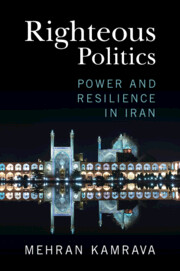Book contents
- Righteous Politics
- Righteous Politics
- Copyright page
- Contents
- Tables
- Preface
- 1 Introduction
- 2 Authoritarian Perseverance
- 3 Ruling under Stress
- 4 The Constitution, Elections, and Legitimacy
- 5 Elected Institutions
- 6 The Unelected Leadership
- 7 The Praetorians
- 8 Maintaining the System
- 9 The Deep State
- 10 Intra-elite Dynamics
- 11 The State and Its Riches
- 12 Conclusion
- Appendix
- Select Bibliography
- Index
5 - Elected Institutions
Published online by Cambridge University Press: 10 August 2023
- Righteous Politics
- Righteous Politics
- Copyright page
- Contents
- Tables
- Preface
- 1 Introduction
- 2 Authoritarian Perseverance
- 3 Ruling under Stress
- 4 The Constitution, Elections, and Legitimacy
- 5 Elected Institutions
- 6 The Unelected Leadership
- 7 The Praetorians
- 8 Maintaining the System
- 9 The Deep State
- 10 Intra-elite Dynamics
- 11 The State and Its Riches
- 12 Conclusion
- Appendix
- Select Bibliography
- Index
Summary
Elections for the presidency, the Majles, and the city councils perpetuate the politics of hybridity, which in turn has left each of these institutions with conflicting legacies. Hybridity has left them neither democratic nor authoritarian, neither paragons of the people’s political will nor symbols and symptoms of an unresponsive and repressive state. Hybridity perpetuates the politics of ambivalence. It renders presidents and parliamentarians and city councilors ineffective if they cross amorphous, undefined redlines. But it also makes them exciting symbols of the popular will if they speak the people’s language, voice their complaints about prices, and promise to better their lives. Hybridity makes normal a neither-here-nor-there routine of the politics of voting and going along with the system, and, on occasion, breaking into protest out of frustration that rituals like voting matter little. Hybridity and ambivalence go hand in hand, reduce the costs of conformity, increase the price of rebellion, and make possible occasional bouts of protest and violence. Like elections, institutions such as the presidency and the parliament entail risks for the authoritarian core of the state, affording potential wildcards institutional platforms and resources to further their own agendas.
Keywords
- Type
- Chapter
- Information
- Righteous PoliticsPower and Resilience in Iran, pp. 106 - 130Publisher: Cambridge University PressPrint publication year: 2023



